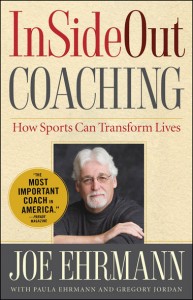Christopher Closeup Podcast – Guest: Joe Ehrmann
You might think that a former defensive lineman for the Baltimore Colts and Detroit Lions would believe a coach’s job—especially a coach of young people—is to teach them to win games. Joe Ehrmann, however, says, “The greatest crisis in America today is a crisis of masculinity…A coach’s responsibilities include helping young people to confront and comprehend the toxic culture that is trying to seduce and shape them.”
Ehrmann came to that belief due to the male influences in his life when he was growing up. When I interviewed him on Christopher Closeup, he explained that he had an angry, verbally abusive, mostly absent father who only gave him approval when he succeeded at a sport. The picture of manhood his father passed on to him was that men were rough, tough and unemotional. In addition, Ehrmann was beaten and raped by a stranger at the age of twelve, leaving him physically and emotionally wounded.
False images of manhood were reflected by coaches for whom Ehrmann played as well. He recalled a basketball game when he was 10-years-old: “The player on top of me wouldn’t allow me to inbound that ball. The coach called time-out…and told me to bring that ball over my head and bring it down on that kid’s face as hard as I could. I knew that didn’t feel right, [but] to validate myself in that coach’s eyes, I went ahead and did that. I split that boy’s nose. He went down on the floor screaming. There was blood everywhere. Afterwards in the locker room, my coach held me up as the epitome of what it means to be a player [that demonstrated] manhood.”
Ehrmann’s propensity for anger and violence lasted many years despite a few positive coaching influences along the way. His healing finally started with help from his wife, Paula, a psychologist. Reading Henri Nouwen’s book, “The Wounded Healer,” was also a major turning point. Ehrmann explains, “All of us, as we go through life…get wounded…Nouwen makes the point that…we really have two choices. One, you can ignore, deny or repress your own woundedness. If you do that, you’ll continue to wound other people with your unhealed wounds…The other choice is to take your own wounds, accept them, bring healing and wholeness into them, then use them as an opportunity to offer other people the chance to heal. So I became a wounded healer.”
One of Ehrmann’s coaching role models is Moses. Though we don’t usually think of the Old Testament prophet in that way, the analogy works. Ehrmann says, “Moses was given this unbelievably difficult coaching job of taking two million people that have just come out of 430 years of slavery, and building them into a team that’s going to represent God’s values. The manifesto of the team is to love God with all your heart, soul, mind and strength—and love your neighbor as yourself. So Moses has to take these relationally, spiritually, and psychologically broken people—and he’s got to rebuild them, help them reformulate who they are.”
 Ehrmann—dubbed “The Most Important Coach in America” by Parade magazine—has now written a book called “InSide Out Coaching: How Sports Can Transform Lives.” He’s also been working with young people, their coaches and even the NFL to promote better coaching philosophies. He says, “I coach to help boys become men of empathy and integrity who will lead, be responsible and change the world for good. That [dictates] how I run my drills, talk to my players, and how I integrate with their parents as well.”
Ehrmann—dubbed “The Most Important Coach in America” by Parade magazine—has now written a book called “InSide Out Coaching: How Sports Can Transform Lives.” He’s also been working with young people, their coaches and even the NFL to promote better coaching philosophies. He says, “I coach to help boys become men of empathy and integrity who will lead, be responsible and change the world for good. That [dictates] how I run my drills, talk to my players, and how I integrate with their parents as well.”
Ehrmann also believes this approach can influence the way young men treat women, saying, “Once you redefine masculinity for boys—understanding that it doesn’t mean power, dominance and control over women, but learning how to be allies and support them—that’s how you bring about radical change [in society].”
Listen to the complete interview with Joe Ehrmann: Christopher Closeup Podcast – Guest: Joe Ehrmann
Photos courtesy Simon and Schuster










